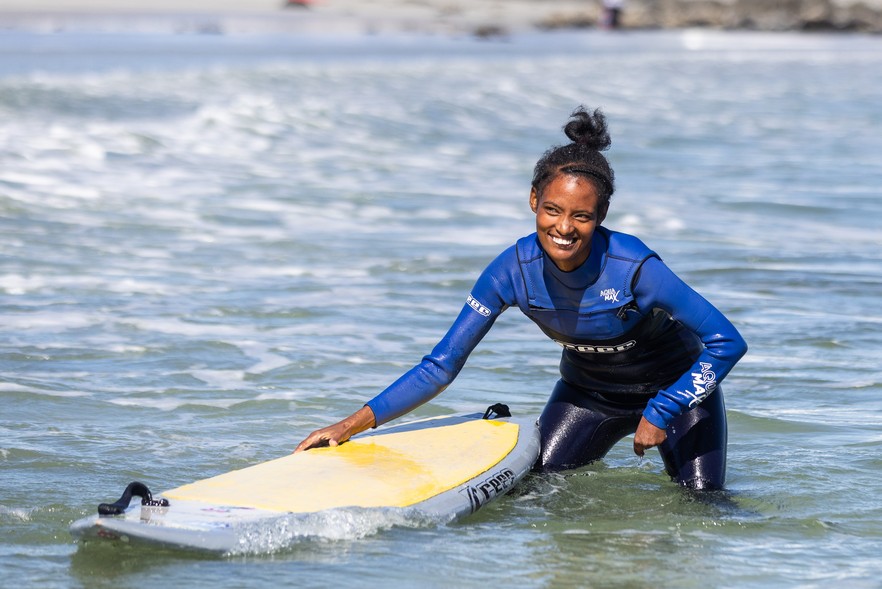
3 April 2025
Mary-Ann de Bruin is the vice-captain of a Saldanha Bay team heading for the South African Para Surfing Championships in Durban this month.
Mary-Ann de Bruin had meningitis as a baby and was left with severe damage to the left side of her body. Three years ago, she started training as a surfer and now she is the vice-captain of a Saldanha Bay team heading for the South African Para Surfing Championships in Durban this month.
De Bruin is part of the Weskus Krewe, the surf school started in 2023 by Extreme Abilities, an organisation based in Saldanha Bay founded by Dries Millard. Millard, who is also on the team going to Durban, is paralysed from the chest down.
Dries Millard founded the Weskus Krewe.
At first it was hard for De Bruin to surf, using one hand only to paddle out. But after three years of rigorous training, she has built up strength and can tackle the Weskus Krewe home break at Paternoster.
Being with the club, says De Bruin, has been life-changing. “It is very good to be here. When you come into the water and when you get out, you feel refreshed.”
The surfers are assisted in the water by volunteers from Pelgrim’s Place, a rehab centre outside Paternoster run by the Healing Wings organisation.
Luke Samsodien in the surf.
The championship, starting on 12 April, will be hosted by the organisation Made for More, and surfers from several organisations as well as individual surfers will take part. This will be the ninth time the competition will be held.
“Our aim is to include, equip and empower people with disabilities,” says Anele Zama from Made for More. “We use different types of sports, surfing being one of them.”
The chairperson of Extreme Abilities and Dries Millard’s brother, Albert, says the idea of an adaptive surfing club came up in 2020, and official paperwork was completed in 2023. Saldanha Bay is better known for its harbour and fishing than for surfing, he says, and people in the town are afraid of the sea.
Albert Millard walks out the surf Leroy Kuys.
“There is an unspoken tradition in our town that no one can swim. That made the entire community afraid of the water,” says Albert.
“We wanted to start a surfing culture on the West Coast,” he says, “starting with disabled people”. The idea was to show that if people with disabilities can surf, so can people without.
“We figured with the disabled surfers, we can eliminate all the excuses for why there’s no surfing on the West Coast,” says Dries.
The rule at Extreme Ability is that disability is no excuse not to try.
Frikkie de Klerk catches a wave.
Team captain Edwill Windvogel says this will be his first visit to Durban. He has schizophrenia and says surfing is therapeutic and helps him remove the voices in his mind.
“Surfing is therapy for me. When I go into the water, I don’t concentrate on anything. I relax my body and I feel free and it’s very nice for me,” says Windvogel, who has been surfing for two years.
The West Coast Community Trust has helped fund the team’s trip to Durban and sponsors have helped with surf gear. But, says Albert, more help is urgently needed. The surfers have no income other than their disability grants, and the cost of the trip to Durban will be about R100,000.
Edwill Windvogel will captain the team.
There will be categories for prone surfing and kneeling surfing in the competition.
Albert says the team hopes to serve as an inspiration to the people of Saldanha Bay and to compete at international tournaments too.
“We want to get gold and silver medals. Once we are back, it will be undeniable that through surfing we can uplift. We hope to inspire our local Saldanha Bay residents to take up surfing, not to be afraid of the ocean, and to dream big.”
Volunteers from Pelgrim’s Place help the surfers in the water.